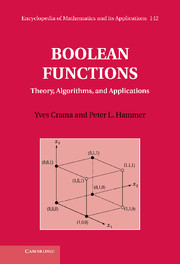Preface
Published online by Cambridge University Press: 01 June 2011
Summary
Boolean functions, meaning {0,1}-valued functions of a finite number of {0,1}-valued variables, are among the most fundamental objects investigated in pure and applied mathematics. Their importance can be explained by several interacting factors.
It is reasonable to argue that a multivariate function f:A1×A2×…×An→A is “interesting” only if each of the sets A1,A2,…,An, and A contains at least two elements, since otherwise the function either depends trivially on some of its arguments, or is constant. Thus, in a sense, Boolean functions are the “simplest interesting” multivariate functions. It may even be surprising, actually, that such primitive constructs turn out to display a rich array of properties and have been investigated by various breeds of scientists for more than 150 years.
When the arguments of a Boolean function are viewed as atomic logical propositions, the value of the function at a 0–1 point can be interpreted as the truth value of a sentence composed from these propositions. Carrying out calculation son Boolean functions is then tantamount to performing related logical operations (such as inference or theorem-proving) on propositional sentences. Therefore, Boolean functions are at the heart of propositional logic.
[…]
Information
- Type
- Chapter
- Information
- Boolean FunctionsTheory, Algorithms, and Applications, pp. xv - xviiiPublisher: Cambridge University PressPrint publication year: 2011
